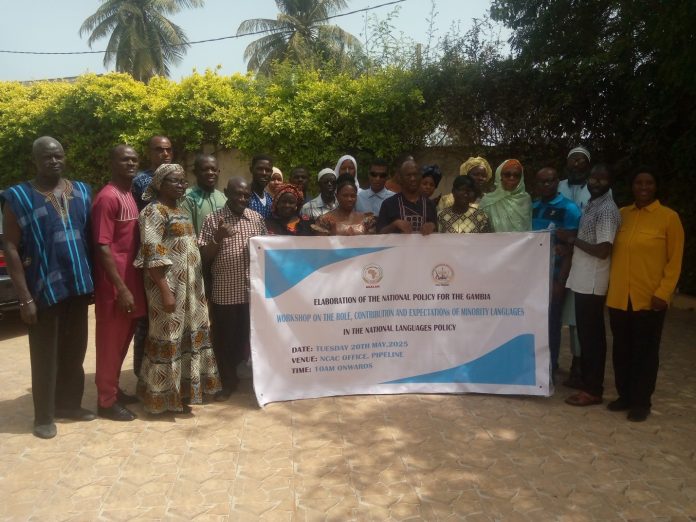By Ndey Sowe
The National Centre for Arts and Culture (NCAC) on Tuesday, 20th May 2025, continued its national consultations for the formulation of The Gambia’s first-ever National Languages Policy.
The session, held at the NCAC Office in Fajara, focused on the theme: “Role, Contribution and Expectations of Minority Languages in the National Languages Policy.” Organised in collaboration with the African Union Academy of Languages (ACALAN), the consultation sought to draw ideas from speakers of minority languages to ensure inclusive and representative policy development.
Participants included representatives from minority language groups such as Creole, Serer, Balanta, Manjago, Bambara, and Sarahule, among others. In the Gambian context, “minority languages” refer to those spoken by smaller ethnic communities or those not widely used in formal or institutional settings.
Hassoum Ceesay, Director General of NCAC, emphasised the inclusive nature of the ongoing consultation process.
“Language affects everybody. We want a policy that will empower national languages to play a stronger role in technology, education, diplomacy, finance, commerce, peacebuilding, trade, politics, and more,” he said.
He noted that NCAC has already held sector-specific consultations with chiefs, teachers, media professionals, politicians, women’s groups, and others to ensure diverse voices shape the policy.
Ceesay acknowledged the unique challenges faced by minority languages.
“Sometimes, numerical strength can result in certain groups gaining more attention. But we want to assure minority language representatives that their voices will be heard, and their roles and contributions to national development will be reflected in the final policy document,” he added.
He further stressed the importance of balance in the policy’s outcome:
“We don’t want to replace the tyranny of English with the tyranny of another dominant national language. All national languages must feel valued and capable of contributing to national development.”
Nana Grey-Johnson, a lecturer at the University of The Gambia, provided a historical and academic perspective.
“Every national language policy reflects an official effort to determine the status and roles of languages in the nation, along with the rights of their speakers,” he stated.
He urged participants to take the discussions seriously, pointing out that the issue demands not just political will but also moral and academic commitment.
“Mastery of history is essential in this endeavour, as we are trying to understand the roots of our human condition to define our national language identity.”
The NCAC and its partners aim to finalise and adopt the National Languages Policy by mid-2025. The policy will integrate local languages into the national education system, especially from early childhood education to Grade 3, with the broader goals of enhancing learning outcomes, preserving cultural heritage, and fostering stronger community engagement.
While English will remain the official language for government administration, the new policy will promote the structured use of local languages, including their continued use in local courts, public awareness campaigns, and elections.
This initiative marks a significant step toward linguistic equity and the preservation of The Gambia’s rich linguistic diversity.


















